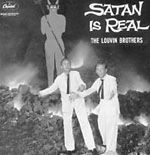Dear Se�El Toro,
Please settle a dispute. My business partner and I run a record store. Recently, a regular customer inquired if we stocked any CDs by the Louvin Brothers. When I failed to recognize the name, he turned surly, suggesting I’d be better suited peddling tour merchandise for Korn. My partner had never heard of these guys either. We even conducted an impromptu in-store poll and still came up with only blank looks. What’s the deal? Have we missed an important chapter of music history? Or can we disfigure this jackass’ face with a crowbar the next time he comes in making outlandish requests?
Jason Hughes Sonic Boom, Fremont
Between 1955 and 1963, Charlie and Ira Louvin racked up countless hits, including “When I Stop Dreaming,” “Cash on the Barrelhead,” and their 1956 No. 1 “I Don’t Believe You’ve Met My Baby.” Their distinctive delivery served as an important link between old-time singing siblings like Bill and Charlie Monroe and the Delmore Brothers, and the changing sound of country throughout the ’50s. Their twin tenor voices, complemented by Ira’s mandolin, influenced many acts that followed, particularly the Everly Brothers.
“Their voices sound like some crazy instrument,” says longtime Louvin lover Neko Case. “Other folks who sang harmony didn’t sound like that.” The local country dynamo knows of what she speaks; as the Corn Sisters, she and Carolyn Mark include two Louvin Brothers covers in their act: “This Little Light of Mine” and the duo’s final hit, “Must You Throw Dirt” (featuring the immortal chorus “You’ve already put big old tears in my eyes/Must you throw dirt in my face?”).
“One of my favorites by them is ‘Alabama,'” continues Case. “It gives me a melancholy feeling, especially after hearing about how harsh life was where they’re from.” Born in 1924 and 1927, respectively, Ira and Charlie Louvin (n饠Loudermilk) grew up in the Sand Mountain region. The only sons among seven children, they devoted their youth to working the family’s 23-acre farm. Inspired by radio broadcasts, the duo began performing publicly in 1940, earning three bucks for singing all day at a 4th of July hootenanny.
The Brothers spent the next 15 years playing tiny auditoriums and fraternal lodges throughout the South and scrounging up short-lived radio gigs. Charlie’s Army enlistment in 1945 did little to speed their progress. After cutting sides for various labels in the late ’40s and early ’50s, the pair landed at Capitol. By 1952, they scored a minor hit, “The Family That Prays Together,” and finally arrived with “When I Stop Dreaming” in 1955.
At the time, the secular “Dreaming” was considered a risky commercial proposition. The Louvins had built their reputation singing gospel-flavored devotional country. (Check out “Broadminded,” the first cut on Razor & Tie’s excellent 1995 compilation When I Stop Dreaming: The Best of the Louvin Brothers, which admonishes tolerance of casual drinking or gambling with the warning, “That word ‘broadminded’ is spelled S-I-N.”) Yet the nation responded favorably, and the boys went on to record over a dozen LPs that balanced the two viewpoints.
While holy-rollin’ may not be a top priority for many contemporary music fans, the Louvins’ spiritual bent only enhances their odd appeal. “I like the religious content [in their songs],” says Neko. “I’ve always been into gospel music, despite the fact that I’m not a religious person, because it’s way more passionate than boring old love songs. Murderin’ songs and songs about God are usually pretty right on, and the Louvin brothers do a lot of both.”
The Brothers also boasted fantastic can-do spirit, going so far as to use scrap rubber and rocks to build the creepy set of Hell that graces the 1959 concept album Satan Is Real. “The scene became a little too realistic, though, when Ira and Charlie were very nearly burned while directing the photography for this dramatic cover photo,” the liner notes reveal. “They burned tires!” squeals Neko. “What a bad idea—I love it!
Driven apart by declining sales and ill-tempered Ira’s escalating alcoholism, the Louvins split in 1963. Charlie went on to a long solo career, and remains a fixture at the Grand Ole Opry. Ira fared less favorably. During a drunken argument, he took three bullets in the back from his third wife. Later, in 1965, he died in an auto accident.
Songs penned by the prolific Brothers have been covered by the Byrds, Gram Parsons, Johnny Cash, and, most recently, Dolly Parton. Emmylou Harris had her first hit with their “If I Could Only Win Your Love.” But while they were certainly stars in their day, they’re sadly no longer household names.
“Maybe the Louvin Brothers were just more influential on folks who influenced other people later,” Neko theorizes. “But they’re in the recipe for sure.”






